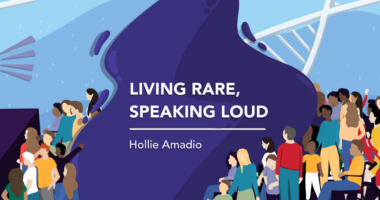The seventh sense that comes with caregiving for our daughter
Parents may be familiar with the sixth sense, but caregivers have another one

Of all the ways to wake up, my aching face in a pool of water ranked pretty low. Unfortunately, that wasn’t something I knew until it happened.
After very extensive surgery to remove four wisdom teeth, I was sent home with my parents, an appropriate and necessary amount of pain medicine, and a sizable ice-filled bandage wrapped around my face.
My parents spent most of the day attending to what I needed, ensuring I ate soft foods, and checking on me around the clock. Due to the medication and the bandages, I was completely reliant on them, which, for me, was the most comfortable place for an 18-year-old to be.
But at 2 a.m., when the bag of ice around my face burst, I could only turn on my light and stare. I was too groggy to get up, and my jaw hurt too severely to yell for help.
“Hey, baby girl,” my dad said as he seemed to appear in my bedroom doorway. “Are you having a hard time?”
Although I registered what he asked, I couldn’t answer him. I just pointed at my face.
In about 15 minutes, my father changed the wet bed sheets, switched out my damp bandage, made sure I had my next round of medication and covered me up so I could go back to sleep.
No, we’re not being paranoid
Many years later, recalling the incident, I asked my father how he knew to check on me.
“Parenting gives you a sixth sense,” he replied. “I woke up, looked at the clock, and had an overwhelming feeling that I needed to see if you were OK.”
Having four of my own kids has taught me that parenting definitely gives you a sixth sense. I have countless stories about catching my kids before they fall off something, recognizing when toddlers are “too quiet,” knowing to check a kindergartner’s book bag for toys, or confiscating hidden M&Ms from pillowcases.
But when you’re caregiving for a chronically ill child, that seems to enact another sense.
When our oldest daughter, whom we lovingly refer to as Ladybug, was diagnosed with hereditary angioedema (HAE) in 2021, I felt so lost.
Before her diagnosis, none of her symptoms had rhyme or reason to them. We could send her to school healthy and get phone calls about her face swelling by mid-morning. She could do cartwheels outside in the morning and barely lift her head by the afternoon. We could serve her favorite foods for dinner, and mid-meal, her stomach pain could be so severe that we feared appendicitis. We had no idea what we were facing, but my husband and I knew it wasn’t good. When we were able to learn more about HAE, things changed.
At first, when I would get a feeling to give our daughter a Berinert infusion because I noticed a slight puffiness in her face, or I noticed her lethargy, or I saw her flinch when she’d touch her face, I’d dismiss it. I never wanted to be one of those overly paranoid parents who overmedicate their children because they misdiagnose symptoms. But soon, we realized we were the furthest thing from being paranoid.
As silly as it may seem, I believe caregiving activates that seventh sense. When a child has a fever, or when flu symptoms have them not feeling like themselves, or even when they accidentally burst an ice bag in the middle of the night, caregivers have a way of knowing that something is wrong and our kids need help.
And the beauty of acting on that seventh sense is that it helps our Ladybug activate her own. Together, when facing HAE, that makes us a force to be reckoned with.
Note: Angioedema News is strictly a news and information website about the disease. It does not provide medical advice, diagnosis, or treatment. This content is not intended to be a substitute for professional medical advice, diagnosis, or treatment. Always seek the advice of your physician or other qualified health provider with any questions you may have regarding a medical condition. Never disregard professional medical advice or delay in seeking it because of something you have read on this website. The opinions expressed in this column are not those of Angioedema News or its parent company, Bionews, and are intended to spark discussion about issues pertaining to angioedema.







Leave a comment
Fill in the required fields to post. Your email address will not be published.